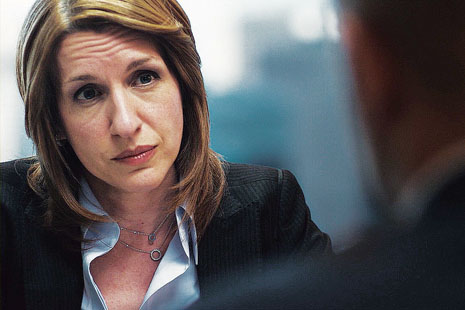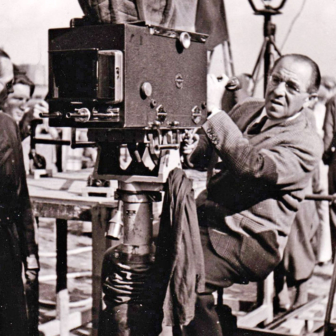THE plot of Margin Call is simple, in fact minimal. A large investment bank discovers that its investments are unsound. Management meets through the night and organises an all-out effort to dump the toxic assets on its counterparties before the news gets out. We see the outcome of this rescue bid as the film draws to a close.
The tension in this understated but compelling movie arises from the fact that most of the participants face the possibility that their careers are over, either because the firm no longer needs them, or because the trading partners on whom they have dumped the assets will never trust them again.
In particular, the risk-management analyst who discovered the problem (Eric Dale, played by Stanley Tucci) has been fired in a mass layoff just before his work is complete. By a combination of bribes and threats he is lured back to the firm and paid a large sum of money to sit in an office, incommunicado, while the sale goes through.
None of the characters in the movie is a cardboard villain like Gordon Gekko in Oliver Stone’s Wall Street but, equally, there is no question of any of them heroically doing the right thing. Dale, having just been fired, is tempted to refuse the firm’s demands for help, but agrees as soon as the price is right. The most sympathetic character, head of sales Sam Rogers (played by Kevin Spacey), agonises over the betrayals involved in selling assets the firm knows to be worthless, but in the end goes ahead anyway.
The rewards handed out at the end are equally arbitrary – those who warned of the impending disaster mostly end up out of work, while those who cashed in at the end get promoted. But of course, even the losers end up with million-dollar payouts.
Comparing Margin Call with older films about the finance sector, including Wall Street, is striking in many ways. First, there’s hardly any exposition of the “As you know, Bob…” variety, in which the intricacies of, say, insider trading or even the eponymous margin calls are explained by one character to another, for the benefit of the audience. Rather, it’s assumed that the viewers have a pretty clear idea about the role of, say, the head of risk management in an investment bank, and the fact that a failure of the volatility assumptions used by the bank’s trading desk is likely to have catastrophic consequences.
Well into the movie, the senior managers appear and ask for explanations of the technicalities. But even here, the point is not to use their ignorance as a pretext for exposition: rather, it’s the fact that the really big payoffs are going to people who, in critically important ways, don’t have a clue what they are doing.
Notably, while some of the characters have (short-lived) ethical qualms about the ruin they are bringing on their clients and counterparties, there’s no suggestion, as in Wall Street, Boiler Room and other finance sector movies, of any illegality that might potentially be exposed. This is entirely realistic. The scandal of the 2008 financial crisis was not the fact that hardly anyone working for any of the major investment banks has been charged with a crime. It’s the fact that, as far as can be determined, the conversion of worthless mortgages and similarly dubious investments into trillion-dollar pyramids of AAA-rated debt was entirely legal. The odd fraudster like Bernie Madoff, ripping off a few tens of billions of dollars, was peripheral to the main game.
It’s also striking that nothing is shown of the consequences of the firm’s actions. The closest we get is when a minor character receives an abusive voicemail message from a business partner to whom he sold the toxic securities in the morning, who has watched his investment plummet in value as the bad news leaked out. The viewer can safely assume that, if the positions had been reversed, the outcome would have been the same.
The millions of people far from Wall Street, most of whom wouldn’t even have known the meaning of a term like mortgage-backed security (at least in 2008), but who were about to lose their jobs and homes as a result of the crisis, don’t even appear as “voices off.” Indeed, there is no one from outside the hermetic world of the financial sector to challenge the assumptions on which the characters base their actions. Rather, the characters in Margin Call speak for themselves, raising and rapidly dismissing any concerns they might have.
The two points at which characters reflect on their role in society are brief enough to be quoted in full. The official line is given by CEO John Tuld, played by Jeremy Irons:
So you think we might have put a few people out of business today. That it’s all for nought. You’ve been doing that every day for almost forty years Sam. And if this is all for nought then so is everything out there. It’s just money; it’s made up. Pieces of paper with pictures on it so we don’t have to kill each other just to get something to eat. It’s not wrong. And it’s certainly no different today than it’s ever been. 1637, 1797, 1819, 37, 57, 84, 1901, 07, 29, 1937, 1974, 1987 – Jesus, didn’t that fuck me up good – 92, 97, 2000 and whatever we want to call this. It’s all just the same thing over and over; we can’t help ourselves. And you and I can’t control it, or stop it, or even slow it. Or even ever-so-slightly alter it. We just react. And we make a lot of money if we get it right. And we get left by the side of the road if we get it wrong. And there have always been and there always will be the same percentage of winners and losers. Happy foxes and sad sacks. Fat cats and starving dogs in this world. Yeah, there may be more of us today than there’s ever been. But the percentages – they stay exactly the same.
This speech is striking for its forcefulness, for the accuracy with which it captures the views that are typical of the financial sector, and for the fact that it is riddled with falsehoods from beginning to end.
Look at Tuld’s history lesson. Only those with an obsessive interest in economic history will notice that he has omitted the panic of 1920 – in the middle of the gap between 1907 and 1929 – from his twentieth-century list. More importantly, he also skated over the striking, and genuine, gap between 1937 and 1974, a period in which there were no major financial crises, primarily because financial institutions like Tuld’s investment bank did not exist.
As anyone who grew up during those years will recall, banks were boring institutions that did not go in for all-night crisis meetings, let alone spectacular failures. (A Monty Python skit from the end of the period mentioned banking as a career only marginally less boring than chartered accountancy.)
To misquote Gordon Gekko, boring is good. Far from promoting economic growth, the financial sector has been a source of economic instability and misallocation of investment whenever it has been left uncontrolled. As Tuld’s list shows, the financial deregulation of the 1970s and early 1980s set the stage for a series of crises that have become steadily more severe. The film is a fictionalised version of the Lehman Brothers crisis of 2008 (though the ending is different), and Tuld’s prediction of similar crises in the future did not take long to be realised. The financial sector’s dominance of the economy was not challenged, despite its spectacular failures.
The postwar decades of strong economic growth and near-full employment have been erased from the historical memory by the financial sector and the majority of those involved in making economic policy. They undermine the case for a finance-driven mode of capitalism that is taken for granted by every character in the movie.
It’s true, of course, that those decades came to a chaotic end in the early 1970s, with the breakdown of the Bretton Woods system of fixed exchange rates, rising commodity prices, and the more general explosion of wage and price controls. But the finance-dominated system that emerged (or re-emerged) in its place has failed just as badly, without ever delivering the kind of broadly shared prosperity of the mid-century boom.
Tuld’s claim that the proportions of rich and poor are unchanging and unchangeable is similarly shown to be false by the experience of the mid twentieth century. The distribution of income, wealth, and economic and social opportunity was far more equal in this period (the “Great Compression”) than at any time before or since.
In Tuld’s view the system is eternal and unchangeable, and the fact that it makes him immensely rich is merely part of the way the universe works. It’s notable, comparing his words with Gordon Gekko’s famous “greed is good” speech, that he makes no suggestion that his actions make the world a better place. Rather, in the words of Margaret Thatcher, “there is no alternative.”
The film’s senior bond salesman Will Emerson (Paul Bettany), after explaining how he spends an income of $2.5 million a year (“booze, dancers and whores,” written off as entertainment expenses, account for a relatively modest and surprisingly precise $76,520), gives a slightly different perspective on this, suggesting that people could change the system if they wanted to:
Listen, if you really wanna do this with your life you have to believe you’re necessary and you are. People wanna live like this in their cars and big fuckin’ houses they can’t even pay for, then you’re necessary. The only reason that they all get to continue living like kings is ’cause we got our fingers on the scales in their favour. I take my hand off and then the whole world gets really fuckin’ fair really fuckin’ quickly and nobody actually wants that. They say they do but they don’t.
Emerson has a point. Most people have ambivalent attitudes to the financial system, eager to take advantage of its offerings when things are going well, and to dish out blame when the inevitable crash happens.
THE answer, I would suggest, is not acquiescence. Rather, it is to recognise that finance, like fire, is both necessary and dangerous. A financial system that works to channel household savings into socially valuable investments, while minimising the associated risks, is a crucial feature of any modern economy. A system that dominates the economy to the point where the production of goods and services becomes a secondary concern is a recipe for disaster.
Margin Call doesn’t take sides on this, or any of the issues it raises. On the one hand, the characters, all presented as flawed, some likeable and some not, present the views they would be expected to hold given their positions, without facing any opposition. Moreover, the disastrous consequences of their actions, not only for the people with whom they do business directly, but also for the millions in the real economy beyond Wall Street, happen out of sight. On the other hand, the audience is inevitably aware of the stakes, and the picture of the financial sector and its workings is far from flattering.
It would probably not have been possible to make a movie like Margin Call before the global financial crisis. In terms of sophistication and awareness of the underlying processes, it is far ahead of an older version of the genre typified by Wall Street. It remains to be seen whether the economy can be reconstructed in a way that will make Margin Call an item primarily of historical interest, or whether, as John Tuld suggests, from now on, “It’s all just the same thing over and over; we can’t help ourselves. And you and I can’t control it, or stop it, or even slow it.” •




